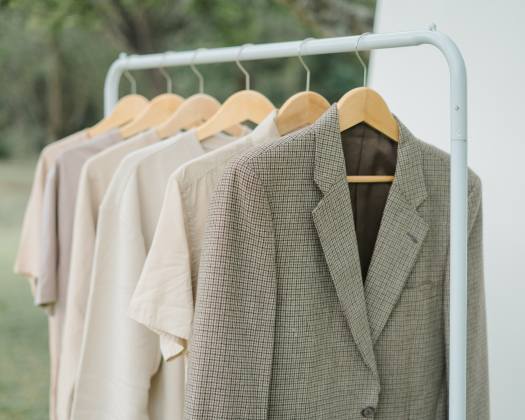Green Glamour: Navigating the World of Sustainable Fashion Choices
In an era where environmental consciousness is gaining momentum, the fashion industry is experiencing a transformative shift towards sustainability. As consumers become more aware of the environmental impact of their choices, the demand for eco-friendly and ethically produced clothing is on the rise. In this blog, we'll explore the concept of "Green Glamour" and delve into the world of sustainable fashion choices that allow you to look chic while making a positive impact on the planet with the Sustainable clothing brands.
Understanding Sustainable Fashion:
Green fashion choices goes beyond just being a trend; it's a commitment to reducing the ecological and social footprint of the clothing industry. It involves making choices that consider the environmental impact of the entire lifecycle of a garment, from raw material production to manufacturing, transportation, and eventual disposal.
Eco-Friendly Fabrics:
The choice of Sustainable fabrics in fashion plays a significant role in sustainable fashion. Opt for clothing made from organic cotton, hemp, Tencel, or bamboo, as these materials are grown without harmful pesticides and chemicals. Additionally, recycled fabrics, such as recycled polyester or nylon, contribute to reducing the demand for new raw materials.
Vintage and Second-Hand Shopping:
Embrace the charm of vintage and second-hand shopping. By giving pre-loved clothing a new life, you contribute to reducing the environmental impact associated with the production of new garments. Thrift stores, consignment shops, and online platforms dedicated to second-hand fashion offer a treasure trove of unique and sustainable finds.
Capsule Wardrobe Philosophy:
Simplify your wardrobe with the capsule wardrobe and Eco-conscious grooming products philosophy. Invest in timeless, versatile pieces that can be mixed and matched to create a variety of outfits. This not only minimizes the need for constant shopping but also encourages a more thoughtful and intentional approach to fashion consumption.
Ethical and Transparent Brands:
Support brands that prioritize ethical practices and transparency in their supply chain. Look for certifications like Fair Trade or B Corp, indicating a commitment to fair wages, safe working conditions, and environmentally responsible practices. These brands are often dedicated to creating fashion that is both stylish and socially responsible.
Local and Artisanal Fashion:
Explore local and artisanal fashion options. Purchasing clothing made locally supports small businesses and reduces the carbon footprint associated with long-distance transportation. Additionally, artisanal craftsmanship often results in unique, high-quality pieces that tell a story of tradition and culture.
Upcycling and DIY Projects:
Get creative with upcycling and do-it-yourself (DIY) fashion projects. Transform old garments into new and stylish pieces or breathe new life into worn-out items with a bit of creativity. Upcycling not only minimizes waste but also allows you to express your unique style through personalized fashion creations.
Renting and Swapping:
Consider renting formal or special occasion wear. Renting outfits for events reduces the demand for one-time-use garments, promoting a more circular fashion economy. Additionally, clothing swap events or online platforms facilitate the exchange of clothing among friends or a broader community, fostering a sense of community and reducing fashion waste.
Educate Yourself:
Stay informed about Sustainable shopping habits and industry developments. Educate yourself on eco-friendly initiatives, circular fashion concepts, and the impact of fast fashion on the environment. Being aware of these issues empowers you to make more conscious choices when it comes to your wardrobe.
Mindful Consumption:
Adopt a mindset of mindful consumption. Before making a purchase, ask yourself if the item aligns with your personal style, if you genuinely need it, and if it fits into your existing wardrobe. This approach helps prevent impulse buying and encourages a more thoughtful and sustainable approach to fashion.
Importance of Sustainable Fashion Choices in 2024
In 2024, the importance of sustainable Slow fashion for men has become more significant than ever, driven by a growing global awareness of environmental and social issues. The fashion industry, known historically for its environmental impact and ethical concerns, is undergoing a transformative shift as consumers demand more responsible practices. Here's why making sustainable fashion choices in 2024 is crucial:
Environmental Impact: The fashion industry has long been associated with environmental degradation, from excessive water usage and pollution to the use of harmful chemicals. In 2024, the detrimental effects of climate change are more apparent than ever, making it imperative for individuals to choose sustainable fashion options. By opting for eco-friendly fabrics, recycled materials, and brands with transparent supply chains, consumers can contribute to reducing the industry's overall environmental footprint.
Waste Reduction: Fast fashion has led to a culture of disposable clothing, where trends change rapidly, and garments are discarded after minimal use. This contributes to the mounting issue of textile waste. Sustainable fashion choices emphasize longevity, quality, and timeless design, promoting the idea of "slow fashion." This shift away from disposable clothing helps reduce the volume of textiles ending up in landfills and encourages a more sustainable consumption pattern.
Ethical Practices: In 2024, consumers are increasingly conscious of the ethical implications of their purchasing decisions. They demand greater transparency from fashion brands regarding fair labor practices, safe working conditions, and fair wages. Opting for brands that prioritize ethical manufacturing and social responsibility ensures that your fashion choices support the well-being of the workers involved in the production process.
Biodiversity Preservation: The fashion industry's reliance on certain raw materials, such as cotton, has contributed to biodiversity loss and ecosystem degradation. Sustainable fashion choices involve opting for fabrics that have a lower environmental impact, promoting biodiversity preservation. Alternatives like organic cotton, hemp, and Tencel support more environmentally friendly agricultural practices, reducing the negative impact on ecosystems.
Promoting Innovation: The push towards sustainability in the fashion industry has sparked innovation in materials and production methods. In 2024, there is a growing availability of eco-friendly fabrics, such as those made from recycled plastic bottles or agricultural waste. Choosing sustainable options encourages further innovation and development of technologies that can drive the industry towards a more sustainable future.
Final Thoughts
As the world of fashion undergoes a green revolution, the choices you make as a consumer can contribute to a more sustainable and ethical industry. Green glamour is not just about looking good; it's about feeling good, knowing that your fashion choices align with a commitment to environmental stewardship and ethical practices. By embracing sustainable fashion, you can make a positive impact, one stylish choice at a time.









